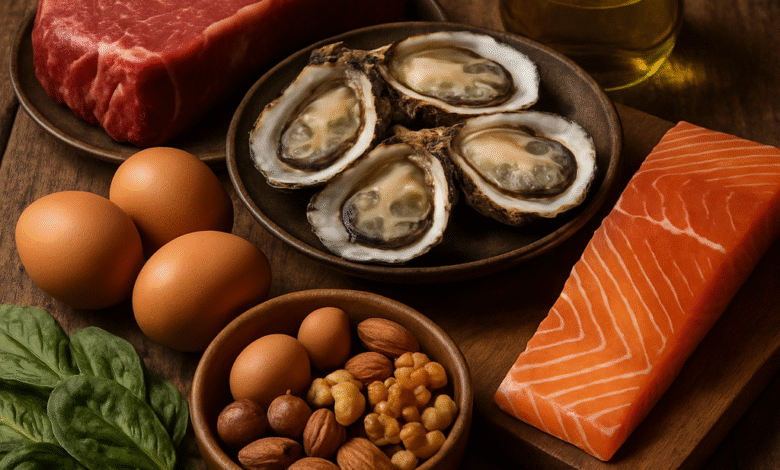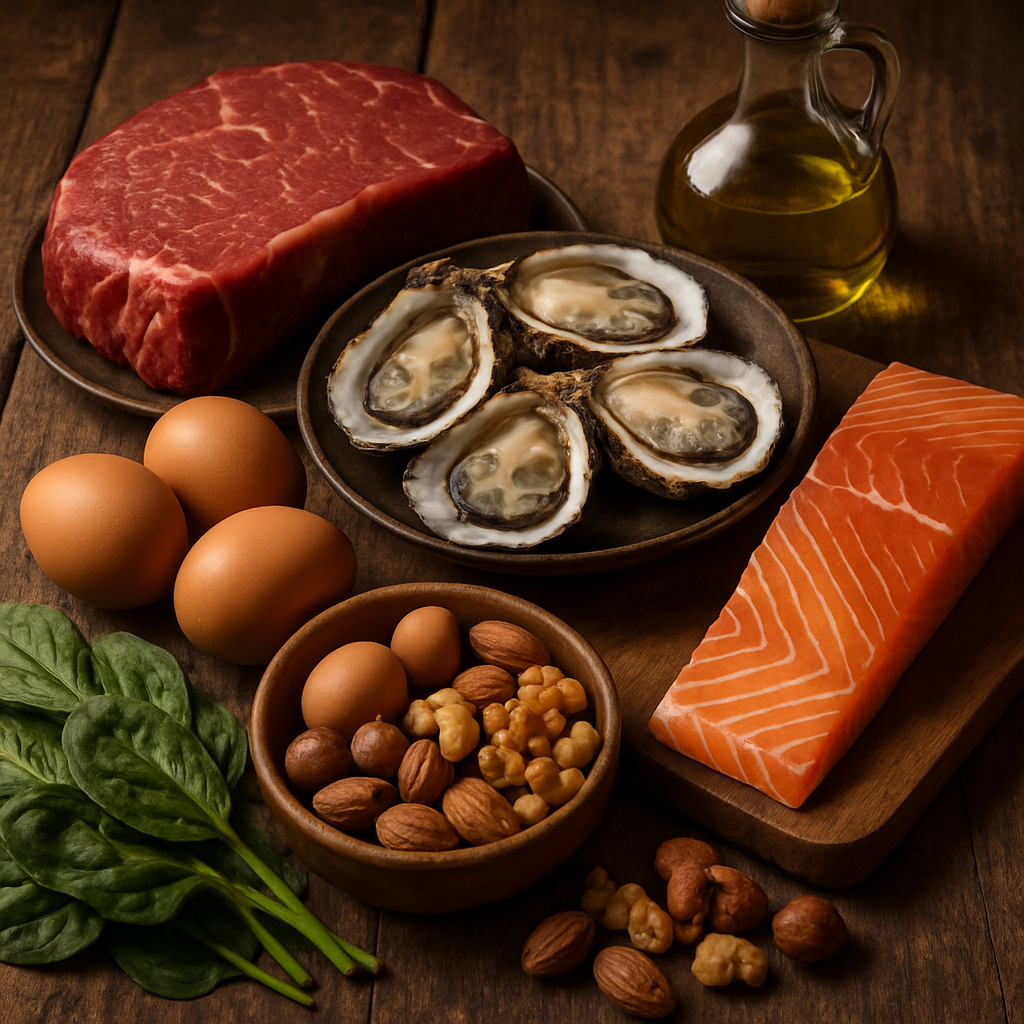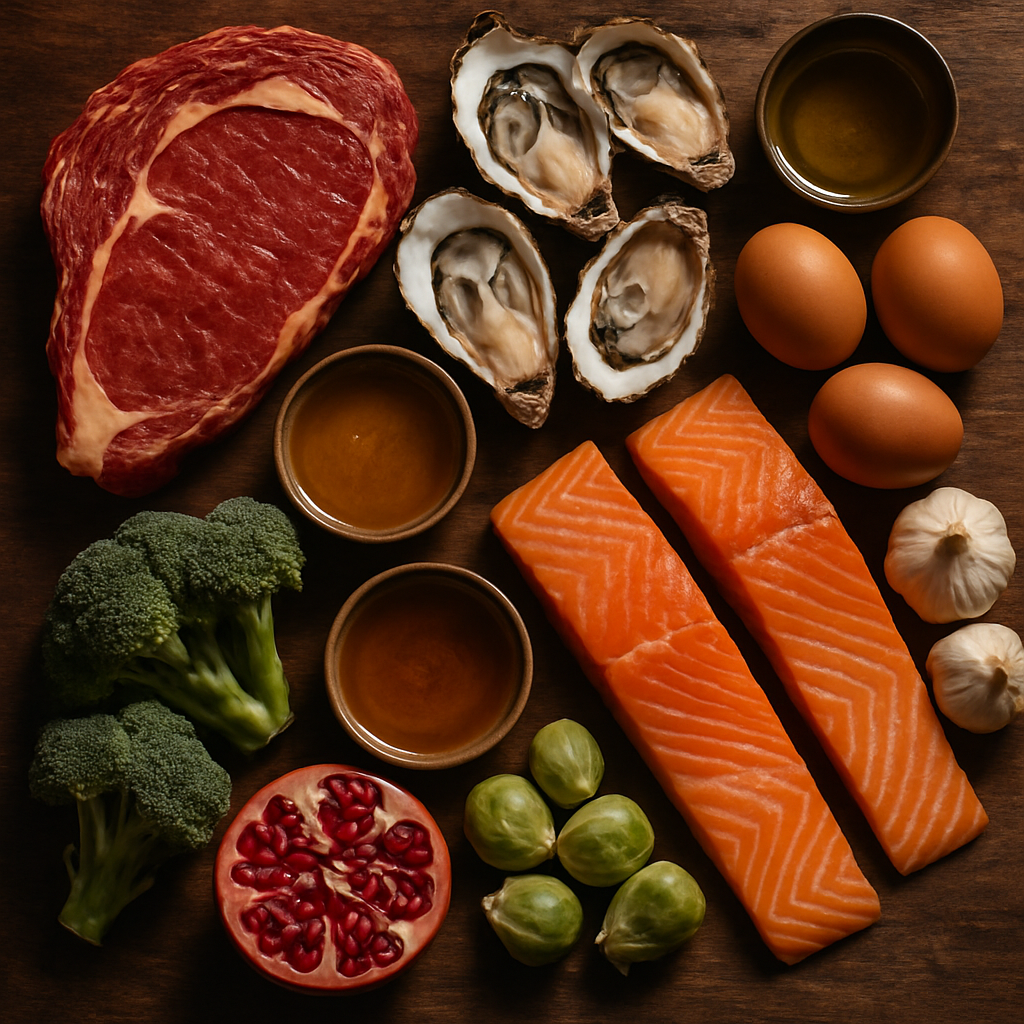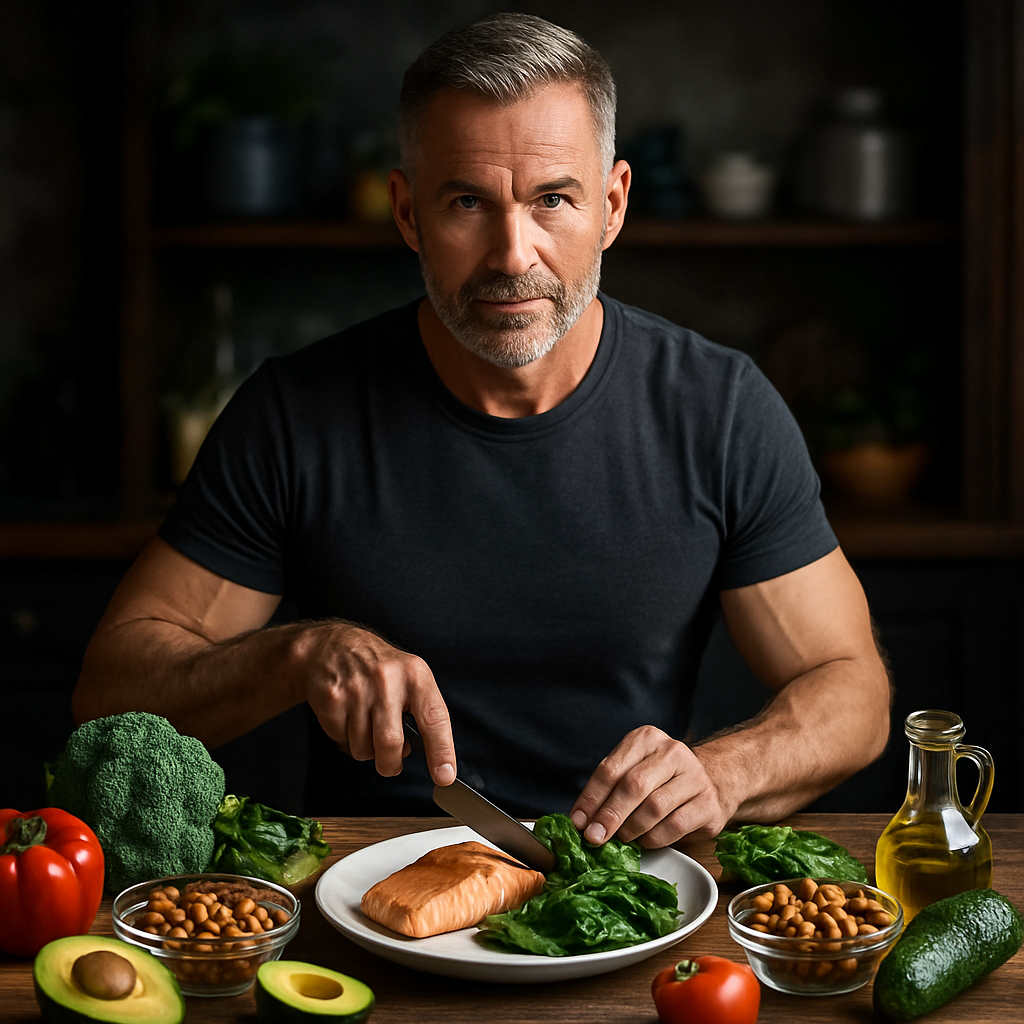Testosterone Boosting Foods for Men: Nutrition Tips for Midlife Vitality

Here’s a reality no one likes to admit: your testosterone levels have probably dropped since you hit 40. And before you blame it all on ‘aging,’ think again. It’s not just time doing its thing. The modern world is actively hacking away at your masculine edge, bite by processed, sugar-laden bite.
You know that sluggish feeling, the creeping loss of muscle, or the dip in drive? It’s all connected to this hormone—the fuel fire behind your strength, vitality, and yes, your sense of being a man.
Yet the myths persist. That testosterone just plummets inevitably and there’s nothing you can do but accept it or chase risky hormone treatments. Bullshit.
Here’s what actually works: the foods you put on your plate every day. Yeah, real, whole foods packed with the right nutrients don’t just support your testosterone—they boost it naturally. This isn’t about quick fixes or gimmicks, but reclaiming something your ancestors took for granted. The power to feel alive, sharp, and ready for whatever life throws at you.
So what’s stopping you from leaning into these testosterone boosting foods for men over 40? If you’ve felt like life after 40 means slowing down, losing steam, or losing your edge, this guide is for you. We’ll cut through the noise, expose the villains in your diet, and spotlight the real foods that take back control over your hormone health.
Because the truth is, you’re NOT broken. You’ve just been fed a lie in a culture that profits from keeping men compliant and weak. Let’s fix that. Let’s fuel your masculine health diet with what your body needs to thrive in this second act of life.
Ready? Let’s dive into the testosterone boosting foods for men that actually work, backed by science and street-smarts alike.
And while you’re at it, if strength training feels daunting or you aren’t sure how to build muscle safely, check out our practical tips in Strength Training for Men Over 40: How to Build Muscle Safely and Effectively. It’s all about pairing the right nutrition with smart movement to keep you strong.
TL;DR: Key Takeaways on Testosterone Boosting Foods for Men
Feeling drained or off your game after 40 isn’t your fate. Testosterone boosting foods for men aren’t some gimmick—they’re your ticket to reclaiming mojo and vitality.
Focus on nutrient-packed power foods—think zinc, vitamin D, healthy fats—that your body actually needs to fire testosterone production. Avoid the hormone killers lurking in processed crap and you’ll be set.
Core Nutrients That Support Testosterone Production
Alright man, here’s the deal: if you’re serious about dialing up your testosterone naturally, it all boils down to feeding the machine with the right fuel. Your body doesn’t just crank out testosterone on nothing. It needs specific nutrients to punch that hormone into high gear.
Think of testosterone production like constructing a tough, lean machine. Without the right building blocks—nutrients—you’re left with weak parts that don’t hold up.
Zinc: The Testosterone Trigger
Zinc is king when it comes to testosterone boosting foods for men. This mineral’s not just about immune function—it’s central to your hormone game. Zinc influences the production of luteinizing hormone (LH), the signal that tells your testes to make testosterone. If you’re deficient, your testosterone can take a nosedive.
Where to find it? Animal proteins like beef, oysters (yes, seriously), and pumpkin seeds pack a zinc punch. In fact, one study with young men showed zinc supplements boosted testosterone levels before and after intense exercise according to research from the NIH. It’s not just hype—zinc deficiency can directly impair testosterone manufacture.
Vitamin D: Your Sunlight Hormone Ally
You might think of Vitamin D only for bones, but it’s right there in the testosterone factory. That’s because Vitamin D receptors hang out on Leydig cells—the testosterone factories inside your testes. Guys low on Vitamin D often show low testosterone levels too. This isn’t coincidence.
You can get Vitamin D from sunlight, sure, but for most guys over 40, your sun exposure is limited—plus your skin’s efficiency drops. Foods like wild-caught salmon and fortified eggs help, but supplementing is often a smart move. A clinical trial showed men taking 3,332 IU of Vitamin D daily saw significant testosterone gains over a year (NIH). Not just for old-timers—this matters for every guy fighting the midlife dip.
Healthy Fats: Cholesterol’s Role in Testosterone
Don’t fall for the low-fat diet scam if you want testosterone. Cholesterol—yes, the villain in mainstream media—is actually the blueprint for testosterone. Without enough good fats, your body struggles to make this hormone.
The key is quality saturated and monounsaturated fats found in grass-fed beef, extra virgin olive oil, and eggs. These fats provide cholesterol, which your body converts into testosterone. Studies report men on higher-fat diets often have better testosterone profiles than those stuck on low-fat regimens (NIH source).
So fill your plate with these fats—steak dinner, drizzled EVOO salad, and eggs cooked sunny side up. Give your body the raw materials it needs.
Magnesium: The Unsung Mineral
Magnesium isn’t as flashy as zinc or Vitamin D, but it plays subtle roles supporting testosterone. It’s essential for reducing oxidative stress and lowering inflammation—both barbarians that beat down your hormone levels.
Magnesium also seems to improve free testosterone by decreasing its binding to sex hormone-binding globulin (SHBG), meaning more active testosterone roaming free to work its magic. Athletes and guys over 40 are often low in magnesium, partly due to diet and stress.
Good news? Leafy greens, nuts, and fish are rich sources, but supplementation combined with exercise may offer the best boost. One study found men supplementing magnesium plus working out had higher testosterone before and after exercise.
Boron and Aromatase Inhibition: Keep Testosterone From Turning into Estrogen
Here’s a kicker: your body naturally converts some testosterone into estrogen via an enzyme called aromatase. When that enzyme gets too active—thanks to age, fat, or toxins—it’s like pouring gasoline on the fire that burns down your masculine edge.
Enter boron. This trace mineral plays a role in kicking aromatase to the curb. Foods like raw honey, nuts, and certain fruits carry boron. Supplementing boron has shown promise in boosting free testosterone and reducing estrogen effects in men (NIH backed).
It’s about balance: supporting the good stuff while shutting down the conversion thieves.
Don’t Overlook Protein Quality
Protein’s role is more about muscle repair than directly pumping testosterone, but it matters. In particular, whey protein appears to support testosterone response better than soy protein, which contains isoflavones—plant compounds that mimic estrogen.
Keep protein intake solid, around 1.6 to 2.2 grams per kg of body weight, focusing on quality sources like whey, beef, and eggs. This supports your muscle and hormonal health without risking a dip in testosterone linked to phytoestrogens.
If you want to know more about how nutrition ties into your strength-building after 40, check out this guide to strength training for men over 40. Great nutrition and exercise go hand in hand.
So, what’s the takeaway here? No single nutrient works magic alone. It’s the combo of zinc, Vitamin D, healthy fats, magnesium, boron, and solid protein that lays down the foundation. This isn’t about quick fixes or gimmicks—it’s about real, natural testosterone support that respects the complexity of your biology.
Fuel your body like you mean it. Cut the junk. Eat these testosterone boosting foods for men—and watch the difference unfold.

Top Testosterone Boosting Foods to Include in Your Diet
Alright, you’ve cut the junk and understand the basic nutrients that matter. Now, let’s get into the real players—the testosterone boosting foods for men that actually fuel your masculine edge.
These aren’t some trendy superfoods hyped by the latest guru. These are the solid, time-tested foods your ancestors thrived on. Ready to add some serious power to your plate?
Grass-Fed Beef: The Zinc & Fat Powerhouse
Beef from grass-fed cows isn’t just about protein. It’s loaded with zinc, which is crucial for testosterone production, and packed with saturated fats that your body uses to make hormones.
Don’t just settle for any cut—go for ribeye, chuck, or sirloin. Cook it simply: sear it hot and rest it well to lock in nutrients.
Here’s the pro move: pair it with vitamin C-rich veggies like bell peppers to help zinc absorption. This combo supports your hormone game better than popping a pill.
Oysters: The Zinc Juggernauts
Oysters have earned their rep for a reason. These shellfish are among the richest natural sources of zinc, a mineral that directly influences testosterone levels.
A couple of oysters a week can seriously boost your zinc stores and, by extension, your hormone levels.
If raw isn’t your thing, grill them with garlic and a squeeze of lemon—delicious and testosterone-friendly.
Eggs (Whole): Cholesterol for Hormone Synthesis
Forget the yolk-haters. Whole eggs are a testosterone builder’s friend.
Why? Your body needs cholesterol from egg yolks to produce testosterone. And these eggs are also rich in vitamin D and healthy fats.
Scramble them with spinach or poach with olive oil drizzle. Just don’t skip the yolks; that’s where the magic is.
Wild-Caught Salmon: Vitamin D and Omega-3s
Got vitamin D deficiency? You’re not alone. Wild-caught salmon is one of the best natural sources.
Vitamin D plays a direct role in hormone production, while omega-3 fatty acids reduce inflammation that can drag down testosterone.
Roast it with herbs and olive oil or go simple—grilled with lemon. Bonus: omega-3s also support heart and brain health, critical for midlife men.
Pomegranate: Your Circulation Ally
Pomegranate isn’t just pretty; its antioxidants improve blood flow, which means better erections and hormone delivery.
Regular consumption can enhance circulation, supporting testosterone function long-term. Sip the juice or toss seeds into salads.
Garlic: The Cortisol Crusher
Stress hormones like cortisol kill testosterone. Garlic helps lower cortisol levels while potentially boosting testosterone itself.
Cook garlic lightly to keep its beneficial compounds intact. Add it to your beef, veggies, or bone broth for that extra punch.
Extra Virgin Olive Oil: Healthy Fats for Leydig Cells
This might sound simple, but olive oil supports Leydig cells, the testosterone factories in your testes.
Include it in your salad dressings or drizzle on roasted veggies. It’s the healthy fat that silently backs your hormone production.
Brazil Nuts: Selenium on Steroids
A couple of these nuts daily can boost selenium levels, a mineral key for testosterone synthesis and sperm health.
Just don’t overdo it—a few nuts are enough. Think of them as your little selenium missiles.
Cruciferous Vegetables: The DIM Destroyers of Estrogen
Broccoli and cauliflower contain DIM, a compound that helps your body metabolize estrogen. Why care about estrogen? Because if it creeps too high, it drags testosterone down with it.
Steam them lightly or toss into stir-fries to keep the nutrients intact.
Raw Honey: Boron’s Sweet Spot
Boron may sound niche, but it’s quietly powerful for testosterone. Raw honey is a natural source and easier to add to your diet than a supplement.
Stir it into your tea or use as a glaze. Just go for raw—processed honey loses the good stuff.
Bone Broth: The Mineral-Rich Elixir
Bone broth deserves a spot because of its minerals like glycine and magnesium, which support overall hormone balance.
Drink a cup daily or use it as a base for soups—comfort food with benefits.
Dark Chocolate (85%+): Antioxidant Bonus
When you need a treat, reach for dark chocolate packed with antioxidants and zinc.
Just check the label. The higher the cocoa percentage, the better. A couple of squares daily won’t sabotage your progress.
Here’s the takeaway: It’s not about a magic bullet. It’s layering these foods, each with specific nutrients, that builds a robust masculine health diet.
Want to know the science behind this list? The zinc in oysters and beef directly impacts testosterone enzymes. Vitamin D in salmon acts like a hormone trigger. DIM from cruciferous veggies keeps estrogen in check. Boron from honey gives testosterone a longer lifespan. Every single one makes a difference.
This is natural testosterone support, not some synthetic gimmick.
Curious about the details driving these benefits? For a solid dive into the male hormonal balance and natural support options, explore reliable info from the NHS male health page. For a research angle on how diet influences hormones, check the National Library of Medicine’s recent findings.
Ready to fuel your comeback? Grab these testosterone boosting foods for men, and start layering them into your day. Your body—and your mojo—will thank you.

Comparison of Testosterone Boosting Foods: Benefits and Nutrient Content
Alright, let’s cut through the noise. When you’re scanning the grocery aisle, how do you know which testosterone boosting foods for men pack the biggest punch?
We’ve talked about the key players—oysters, grass-fed beef, wild salmon, eggs, and a handful of others. But here’s the real deal: each brings a different set of nutrients and benefits to the table. It’s not just about piling them in—it’s about understanding what each food offers so you can fuel your masculine health diet like a pro.
Zinc Powerhouses: Oysters and Grass-Fed Beef
Zinc is the rockstar nutrient here. You need it because it directly influences the enzymes that spark testosterone production. Oysters? They’re the heavyweight champion, loaded with zinc in a way few foods can match. Just a half dozen oysters delivers more than your daily zinc needs.
Grass-fed beef isn’t far behind. It’s not only rich in zinc but also provides B vitamins and saturated fats—both vital for hormone synthesis. Plus, grass-fed versions have better fatty acid profiles than conventionally raised beef, meaning you get cleaner fuel for your body’s testosterone engine.
Vitamin D and Omega-3 Fatty Acids: Wild-Caught Salmon
Think of vitamin D like a hormonal trigger—without it, testosterone production stalls. Wild-caught salmon gives you a fat-rich combo of vitamin D and omega-3s, which support hormone production and reduce inflammation that can sabotage your testosterone levels.
That omega-3 fat also helps keep your heart and brain sharp. So, it’s a win-win when you include salmon in your lineup.
Cholesterol and Healthy Fats: Whole Eggs and Extra Virgin Olive Oil
Here’s a surprise: cholesterol helps build testosterone. Your body literally needs it as a raw material. So yes, eating whole eggs with yolks isn’t just okay—it’s smart. Eggs also bring protein and vitamin D, essential cogs in the testosterone machine.
Extra virgin olive oil rounds out your fat game. It’s rich in monounsaturated fats that enhance Leydig cell function—the testicular cells crafting testosterone. Plus, it’s an anti-inflammatory ally.
Phytonutrients and Antioxidants: Cruciferous Veggies and Pomegranate
Estrogen can steal the spotlight when testosterone dips. Cruciferous vegetables like broccoli deliver DIM (diindolylmethane), which nudges your body to keep estrogen in check, letting testosterone take center stage.
Pomegranate provides powerful antioxidants that boost blood flow and reduce oxidative stress—two things that help maintain healthy testosterone levels and overall vascular health.
Other Game-Changers: Garlic, Brazil Nuts, and Raw Honey
Garlic isn’t just for flavor. It lowers cortisol, a stress hormone that’s a notorious testosterone killer. Brazil nuts pack selenium, supporting antioxidant defenses critical for testosterone stability.
Raw honey provides boron, a trace mineral that extends testosterone’s lifespan in your body and can enhance free testosterone levels.
Wondering how all these compare head-to-head? Let’s put it in a table—because nothing beats side-by-side clarity:
| Food | Key Nutrients | Testosterone Benefits | Quick Eat Tip |
|---|---|---|---|
| Oysters | Zinc, Vitamin B12 | Turbocharges testosterone production enzymes | Eat raw or lightly cooked with lemon for max zinc absorption |
| Grass-Fed Beef | Zinc, B Vitamins, Saturated Fat | Supports hormone synthesis, provides clean fats | Grill or pan-sear; keep it medium-rare for nutrient retention |
| Wild-Caught Salmon | Vitamin D, Omega-3 Fatty Acids | Boosts testosterone triggers, reduces inflammation | Roast with herbs or grill; add lemon zest for flavor |
| Whole Eggs | Cholesterol, Vitamin D, Protein | Raw material for testosterone, hormone support | Scramble or soft-boil—but eat the yolks! |
| Extra Virgin Olive Oil | Monounsaturated Fats | Enhances testosterone-producing Leydig cell function | Use as salad dressing or finish cooked veggies |
| Cruciferous Vegetables | DIM, Fiber | Keeps estrogen balanced, protects testosterone | Steam or roast broccoli and cauliflower for easy meals |
| Pomegranate | Antioxidants, Polyphenols | Improves circulation and lowers oxidative stress | Snack on seeds or drink fresh juice |
| Garlic | Allicin | Lowers cortisol, indirectly aids testosterone | Add to sauces, dressings, or roasted veggies |
| Brazil Nuts | Selenium | Supports antioxidant enzymes, protects testosterone | Snack on 2–3 nuts daily—don’t overdo it! |
| Raw Honey | Boron, Antioxidants | Extends testosterone lifespan, improves free testosterone | Use as a natural sweetener in tea or yogurt |
So, what’s the takeaway here? It’s not about eating just one “magic” food. It’s about building a testosterone boosting foods arsenal—a lineup that hits every angle: from zinc and vitamin D to antioxidants and healthy fats.
Mixing foods that reduce estrogen, lower stress hormones, and supply raw materials for testosterone production is your ticket back to prime masculine vitality.
It’s worth noting your body absorbs zinc better from animal-based sources like oysters and beef, so prioritize those over plants if you want the most impact according to trusted nutritional guidance.
And hey, don’t just take my word for it—there’s solid science behind this strategy confirmed by recent research on dietary impacts on male hormones. This isn’t guesswork; it’s about feeding your body exactly what it needs.
Next time you hit the store or plan meals, think like a fighter gearing up for battle—with a diverse, nutrient-rich testosterone boosting foods for men lineup that’ll have you feeling like you’re climbing your second summit.
Dietary Habits and Lifestyle Tips to Maximize Testosterone Levels
Alright, let’s get real for a second: your diet and lifestyle aren’t just background noise in the testosterone game—they’re the frontlines. You can’t out-eat a bad lifestyle. You feel sluggish, stressed, and off your game? Yeah, your hormones are taking the hit like a punch to the gut.
But here’s the kicker—if you dial these habits in, you’re not just supporting your testosterone, you’re firing up the whole system. This isn’t some vague “eat better” advice. Let’s break down what actually moves the needle.
Keep Inflammation in Check with Food and Habits
You probably know inflammation’s the enemy of good hormone balance. Chronic low-grade inflammation sneaks in through poor diet, stress, and even lack of sleep. This inflammation dampens Leydig cell function—that’s the testicles’ testosterone factory.
So what’s the dietary quick fix? Cut back on processed junk and refined sugars that stoke inflammation. Instead, pack your plate with foods high in antioxidants—think leafy greens, colorful veggies, and nuts like Brazil nuts rich in selenium. This combo supports your body’s antioxidant defenses to protect testosterone molecules from oxidative damage. It’s science-backed and practical simultaneously.
Heads up: consistent alcohol consumption is a sneaky testosterone killer. It disrupts your liver’s glucose output, messes with nutrient absorption, and tankers your sleep quality—all vital for healthy hormone levels according to the Irish Health Service Executive. The takeaway? If you want to maximize testosterone boosting foods for men, alcohol’s moderation (or absence) can’t be ignored.
Harness Healthy Fats, Ditch the PUFA Overload
Your masculine edge is a fat game. Testosterone is a steroid hormone built from cholesterol, so low-fat diets or reliance on cheap, processed vegetable oils high in polyunsaturated fats (PUFAs) can gum up the works.
Go for saturated fats and monounsaturated fats instead—the kind found in grass-fed beef, extra virgin olive oil, wild salmon, and eggs. These fats fuel hormone production and help keep your Leydig cells running at full throttle. Forget the fear-mongering around saturated fat; traditional diets rich in these fats supported men long before the industrial food mess.
Pro tip: Including bone broth in your diet isn’t just trendy. It’s loaded with glycine and minerals that support liver detox and hormonal balance. The liver is key to processing hormones efficiently, so don’t shortchange it.
Don’t Sleep on Sleep and Stress Management
I’m not sure if it’s just me, but there’s nothing worse than waking up tired after a restless night. Poor sleep slashes your natural nocturnal testosterone surge. Plus, elevated cortisol from chronic stress is a testosterone antagonist—it lowers production and boosts estrogen conversion.
Building lifestyle routines that prioritize deep, restorative sleep is mandatory. Go old-school: consistent bedtimes, ditch blue light before bed, keep the room cool. If stress is knocking you sideways, physical activity like strength training, or meditative practices can help reset your system.
Moderate Exercise: Lift Heavy but Smart
Don’t overtrain—too much cardio or endless hours in the gym can crank cortisol and tank testosterone. Instead, focus on resistance training with compound lifts like deadlifts, squats, and bench presses. Short, intense sessions stimulate hormone release without draining your resources. Your ancestors didn’t run marathons; they hunted, fought, lifted heavy stuff.
All these habits aren’t isolated moves; they feed each other. Better food improves sleep quality, which lowers stress and drives testosterone. Smart training enhances hormone balance and overall energy.
So, what should you do next?
- Lean into the testosterone boosting foods for men that support whole-body health: vibrant veggies, healthy fats, and mineral-rich nuts.
- Cut processed junk and alcohol to ease inflammation and give your glands a fighting chance.
- Prioritize 7-9 hours of quality sleep and incorporate stress-busting routines that work for you.
- Keep exercise focused on short, intense resistance training sessions rather than endless cardio.
Want the science? The NIH’s comprehensive review of nutrition and lifestyle’s impact on male hormones offers an eye-opener about how these levers affect fertility and testosterone production according to the National Library of Medicine. Knowing the facts helps you fight smarter, not harder.
Life after 40 isn’t a passive decline—it’s your second summit. Fuel yourself smartly and live with that controlled fire inside.

When to See a Doctor: Low Testosterone Symptoms and Testing
Look, you know your body better than anyone. But sometimes, what’s going on isn’t just “getting older” — it’s low testosterone silently dragging you down.
That nagging fatigue, the lost mojo in the bedroom, or the stubborn belly fat that won’t budge even after you tweak your diet with testosterone boosting foods for men? Those aren’t just annoyances; they’re early warning signs.
Spotting the Real Symptoms: What’s Worth Your Attention?
Here’s what most guys ignore or chalk up to stress:
- Decreased libido and fewer spontaneous or morning erections.
- Fatigue and low energy that’s not fixed by sleep.
- Loss of muscle mass despite effort in the gym.
- Mood shifts — irritability, depression, or brain fog.
- Unexplained weight gain, especially around the midsection.
- Difficulty concentrating or poor memory.
These symptoms don’t just affect your body — they chip away at your confidence and how you show up in life.
But here’s the kicker: symptoms alone don’t tell the whole story. You can have borderline testosterone numbers and still suffer, or sometimes exhibit symptoms that have different roots.
So, When Should You Get Tested?
If these warning signs have been creeping in for a few weeks — heck, even months — it’s time to roll up to your doc.
But not just any random afternoon will do. Testing should happen first thing in the morning, when testosterone is at its peak, ideally on two separate days to confirm the diagnosis. This is clinical gold standard, according to the American Urological Association’s guidelines.
Blood tests measure total testosterone levels — below 300 ng/dL usually sets off alarm bells. But your clinician might also check luteinizing hormone (LH) levels to understand if it’s a testicular issue or a pituitary signaling problem.1
What About Those Other Health Clues?
Beyond the basics, doctors often recommend testing if you’ve got unexplained anemia, bone loss, type 2 diabetes, or if you’re on medications like corticosteroids or narcotics. Low testosterone often hides behind these conditions, making diagnosis trickier.2
And if you’re fighting fatigue alongside unlikely factors like shrinking testicles or mood swings, don’t wait. Early detection helps you avoid the mess of untreated testosterone deficiency — which can sneakily increase risks for heart disease and osteoporosis.
Testosterone Therapy — Is It Right for You?
Getting tested is step one. Deciding on treatment is another dance. The truth is, many men start therapy without getting their levels checked first — or skip follow-up tests once therapy begins.3 That’s like setting off on a road trip without a map.
If your testosterone levels are genuinely low and symptoms align, doctors will guide you on therapy options — from gels and injections to pellets. But your journey should be monitored with repeated tests every 6-12 months to dial in the dose and avoid side effects.
Keep in mind, testosterone therapy isn’t a magic bullet — it’s a powerful tool best used alongside that masculine health diet you’re building with testosterone boosting foods for men.
So, what should you do next?
- Listen closely to those changes in your body.
- Schedule a morning testosterone test if symptoms persist.
- Work with a doctor who understands midlife male health, not just toss pills at you.
Ultimately, owning your testosterone means knowing when to fight and when to get professional backup.
Take that first step before the silent slump takes hold.
Sources:
- AUA Testosterone Deficiency Guideline
- NCBI Review on Male Hypogonadism
- Testosterone Prescribing Trends & Monitoring
Conclusion: Taking Control of Your Testosterone Naturally After 40
Look, I get it—you’re not just dealing with a number on a lab report. It’s that foggy feeling mid-afternoon, the creeping loss of strength, or the way your motivation takes a nosedive. Low testosterone doesn’t just sneak up; it hijacks your energy and your sense of self. But here’s the thing: you don’t have to surrender to it.
Taking control of your testosterone naturally is about more than eating right—it’s reclaiming your edge after 40. You’ve seen the trap: modern diets stuffed with processed junk, toxic chemicals lurking everywhere, and quick fixes that only mask the problem. That’s why focusing on testosterone boosting foods for men—real, nutrient-dense powerhouses—makes a world of difference.
Think about how your ancestors fueled their bodies: eating whole foods, rich in zinc, vitamin D, healthy fats, and antioxidants. It’s that primal blueprint that still works because it speaks your biology’s language.
So, what’s next? Start simple. Swap out the crap for foods that actually increase testosterone. No gimmicks, no pills that patch symptoms. Just solid nutrition paired with smart lifestyle moves like quality sleep and stress control.
You’re in the driver’s seat. Own this second act of your life. Remember, every meal is a chance to boost your hormones and rebuild your manhood—naturally, powerfully, unapologetically.
FAQ: Common Questions about Testosterone Boosting Foods for Men
Look, you’re probably wondering if all this talk about testosterone boosting foods for men is just health hype. That’s fair—there’s a lot of noise out there. But these aren’t magic pills or empty promises. It’s about real foods that talk to your biology and help put testosterone back in play naturally.
Which foods truly increase testosterone levels?
The heavy hitters include zinc-rich foods like oysters and grass-fed beef, vitamin D powerhouses like wild-caught salmon, and healthy fats from extra virgin olive oil and eggs. These nutrients support hormone production at its core. For example, zinc is essential for testosterone synthesis, while vitamin D acts like a natural steroid hormone, dialing up your T levels. Don’t overlook antioxidant-packed options like pomegranate and dark chocolate—they help cut down inflammation, which can drag your testosterone down.
Can diet alone fix low testosterone?
Not exactly.
Your diet sets the stage, but you’ve got to back it up with sleep, stress management, and movement. Without these, even the best testosterone boosting foods won’t hit their full potential. Real talk: a greasy convenience meal followed by junk sleep doesn’t play nice with your hormones, no matter what you eat.
How fast can you expect results from testosterone boosting foods?
It’s a gradual process, not an overnight fix.
Most guys see subtle shifts in energy, mood, and strength within a few weeks. Full hormonal balance takes longer. Consistency is king here. Think of it like tuning a high-performance engine—you don’t just swap the oil once and expect a race win. Keep feeding your body the right fuel.
Are supplements necessary if I focus on testosterone boosting foods?
Supplements can help when there are gaps—like vitamin D in winter or if you’re zinc-deficient—but they’re not the main event.
Pill popping without cleaning up your diet, sleep, and stress is like fixing a leaky boat with duct tape. Focus on getting hormone-supporting nutrition straight from your plate first. Supplements just support that foundational work.
Do weight loss and testosterone levels really connect?
Absolutely, yes.
Excess body fat converts testosterone into estrogen, dragging your T levels down. Research confirms that sustained weight loss—whether through diet or bariatric surgery—can boost testosterone in men by reducing fat-triggered hormonal interference. So tackling the scale while eating testosterone boosting foods works in tandem.
Is it normal for testosterone to decline with age even if I eat well?
Testosterone does dip as you get older, but it’s not some unstoppable decline.
Modern life—thanks to stress, poor diets, and inactivity—hits you harder than age itself. Feeding your body the right nutrients gives you a fighting chance to hold on to your masculine edge. So don’t buy into the “just get old and quit” story.
Where can I learn more about how lifestyle and nutrition impact testosterone?
Good question. For science-backed insights into hormone-supporting diet and lifestyle, the article on weight loss and hormone changes by the University of New South Wales sheds light on how your choices actually shift testosterone levels over time (especially in men over 40).
Also, for deep dives into the biology and effects of testosterone treatments and nutrition, solid reviews from ScienceDirect provide useful context.
Bottom line? Testosterone boosting foods for men aren’t some fad—they’re a real, natural tool in your arsenal. Start with those powerhouse choices we’ve covered, back them with smart lifestyle moves, and give your body the respect it deserves.







